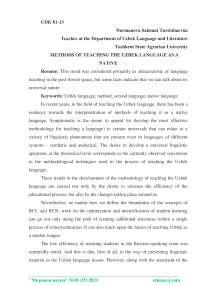Methods of teaching the Uzbek language as a native
Автор: Nurmanova S.T.
Журнал: Мировая наука @science-j
Рубрика: Основной раздел
Статья в выпуске: 10 (55), 2021 года.
Бесплатный доступ
Resume: This trend was considered primarily as characteristic of language teaching in the post-Soviet space, but some facts indicate that we can talk about its universal nature.
Uzbek language, method, second language, native language
Короткий адрес: https://sciup.org/140265880
IDR: 140265880 | УДК: 81-13
Текст научной статьи Methods of teaching the Uzbek language as a native
In recent years, in the field of teaching the Uzbek language, there has been a tendency towards the interpenetration of methods of teaching it as a native language. Symptomatic is the desire to appeal (to develop the most effective methodology for teaching a language) to certain universals that can relate to a variety of linguistic phenomena that are present even in languages of different systems - synthetic and analytical. The desire to develop a universal linguistic apparatus at the theoretical level corresponds to the currently observed syncretism in the methodological techniques used in the process of teaching the Uzbek language.
These trends in the development of the methodology of teaching the Uzbek language are caused not only by the desire to increase the efficiency of the educational process, but also by the changes taking place around us.
Nevertheless, no matter how we define the boundaries of the concepts of RCL and RCN, work on the optimization and intensification of student learning can go not only along the path of creating additional structures within a single process of school education. It can also touch upon the basics of teaching Uzbek as a mother tongue.
The low efficiency of teaching students in the Russian-speaking team was repeatedly noted. And this is due, first of all, to the way of presenting linguistic material in the Uzbek language lesson. However, along with the statement of the fact that this category of children lags behind Russian students, material is accumulating that testifies to the advantages.
Attempts to improve the system of teaching the Uzbek language in Russian schools have been undertaken for a long time and regularly, but they do not go beyond the framework of individual alternative methods and programs, and it seems that there is a need to create a unified updated approach to teaching the Russian language, taking into account all the challenges that characterize the current situation. around schooling. There is a need for the emergence of a methodology that can qualitatively and quickly, with lower costs, teach all students of the modern Russian school without exception, or, at least, make it easier for them to learn the Uzbek language.
It seems that an understanding of the importance of acquiring solid knowledge of morphemic and word formation, as well as morphology, is found in each teaching material for language, because there are sections that teach morphemic and word-formation analysis, and spelling rules are distributed according to specific parts of speech, and the syntactic analysis of sentences accompanies the study of punctuation rules. However, it is easy to see that we are dealing, for the most part, with the formal principle of the distribution of material, and rarely where is constant reliance on knowledge of a basic nature provided. The worst situation is precisely with the sections "Morphemic" and "Word formation", the repetition of which is episodic and in no way connected with the entire learning process. Thus, we are building a building of competent command of the Russian language without a foundation. It is not surprising that the results of our work cannot fully please us.
If, in the above case, the methods of teaching Uzbek as a native language agreed in the same assessment of the importance of knowledge of certain sections of the school curriculum and the sequence of their mastering, then the RFL method itself can be in demand in a modern school due to the leading method of presenting language material in it. In accordance with the communicative methodology prevailing in teaching Russian as a foreign language, it is customary to go from meaning to the form of its expression in teaching Russian, in contrast to the leading principle of descriptive grammar - from formal classification to the rules of literate writing. If in mastering the rules of spelling and punctuation this approach is still possible, then in teaching coherent speech (speech development) the principles of work adopted in RFL may be more effective, especially in our time, when modern schoolchildren experience enormous difficulties in choosing the right way of expressing thoughts in a specific situation. The most striking example of such difficulties, but far from the only one, can be the inability of the majority of students to select a neutral version of any colloquial expression (or word) in the process of writing an essay.
Список литературы Methods of teaching the Uzbek language as a native
- Balykhina TM Methods of teaching the Uzbek language as non-native, new. - M.: Publishing house of RUDN, 2007.185 p.
- Badmaev B. Ts., Khoziev BI Methods of accelerated teaching of the Russian language: method. manual for the teacher. - M.: Humanit. ed. center "VLADOS", 1999. 232 p.
- Halperin P. Ya. General view of the doctrine of the so-called stage-by-stage formation of mental actions, ideas and concepts / pod. for publication by M. A. Stepanova // Vestnik Mosk. un-that. Ser. 14. Psychology. - 1998. No. 2. P. 3-8.
- Kirov EF Russian language as a second language and its theoretical foundations // Notes of the Mining Institute. - 2011.T. 193. S. 229-233.
- Galiakberova A. R. Error correction in foreign languages teaching process //Вопросы науки и образования. - 2019. - №. 4. - С. 98-101.
- Нигматуллина А. Ш., Галиакберова А. Р. Некоторые особенности обучения иностранному языку студентов неязыковых факультетов вузов //Вопросы науки и образования. - 2018. - №. 1 (13).


